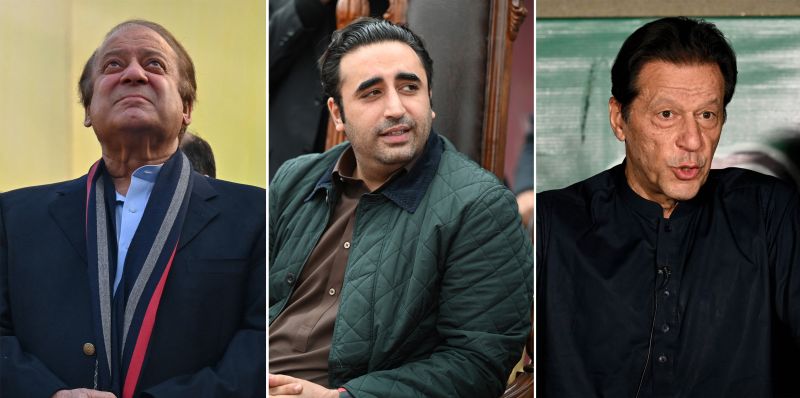
Mobile internet suspended as Pakistan heads to polls in election mired in controversy
Pakistani authorities shut mobile internet services across the country as millions headed to the polls on Thursday for an election in which old dynasties are vying for power while the country’s widely popular former leader languishes behind bars and militants ramp up deadly attacks.
The much-anticipated vote, already delayed for months, comes as the country of 220 million faces mounting challenges – from economic uncertainty and frequent militant attacks, to climate catastrophes that are putting its most vulnerable at risk.
In a vivid illustration of the surging political violence in the run up to the vote, 30 people were killed in twin blasts targeting campaign offices in the country’s restive Balochistan province on Wednesday, which the Islamic State Pakistan Province militant group claimed responsibility for.
On Thursday, another blast in the region killed two security personnel and injured seven more people at a polling station.
And Mohsin Dawar, a former member of the Pakistani National Assembly, said Taliban militants had taken over polling stations in the country’s Khyber Pakhtunkhwa province.
“Militants have been issuing threats to the locals and to the polling staff,” he wrote in a letter to the Election Commission of Pakistan Thursday, adding that three female polling agents “very narrowly escaped attacks” in a polling station.
Pakistan’s Interior Ministry said Thursday it had decided to temporarily suspend mobile internet services nationwide.
“As a result of the recent incidents of terrorism in the country, precious lives have been lost, security measures are essential to maintain the law and order situation and deal with possible threats,” a statement from the ministry said.
Bilawal Bhutto Zardari, chair of the Pakistan People’s Party (PPP) and one of the candidates for prime minister, said he has asked his party to approach the country’s Election Commission and the courts over the restrictions.
“Mobile phone services must be restored immediately,” he wrote on social media platform X.
Some activists accused the authorities of censorship, saying the internet suspension was “political in nature” and not “mandated by the court.”
“Access to the internet during elections is critical as evidence of instances of rigging can be reported live by citizens on social media, and journalists can report live,” said Usama Khilji, a digital rights activist from Islamabad.
“Not having internet access can create a sense of panic for voters, and discourage some from going to vote, especially women voters for whom mobility is already an impediment.”
Pakistan will also temporarily close its border crossings with Iran and Afghanistan as a security measure, according to Foreign Ministry spokesperson Mumtaz Zahra Baloch.
Elsewhere, political tensions are running high amid accusations of interference by the military, which it denies.
The United Nations High Commissioner for Human Rights (OHCHR), Volker Türk, urged authorities to ensure a “fully free and fair vote” in a statement Tuesday.
“Elections are an important moment to reaffirm the country’s commitment to human rights and democracy, and to ensure the right to participation of all its people, including women and minorities,” OHCHR spokesperson Liz Throssell added.
Analysts have described the vote as the least credible in the country’s post-independence history, accusing authorities of “pre-poll rigging” amid a wide crackdown on popular former leader Imran Khan’s Pakistan Tehreek-e-Insaf (PTI) party.
Cricket icon Khan, 71, who was ousted from power in a storm of controversy, remains imprisoned on multiple convictions and banned from contesting the vote against his rivals. The PTI has been prohibited from using its famous cricket bat symbol on ballots, dealing a blow to millions of illiterate people who might use it to cast their vote, and television stations are banned from running Khan’s speeches.
His longtime foe, veteran politician Nawaz Sharif, 74, a scion of the elite Sharif political dynasty, is seeking a historic fourth term as leader in what would be a remarkable political comeback following years of self-exile overseas after he was sentenced to prison on corruption charges.
Sharif remains widely popular in Pakistan’s Punjab province – the country’s most populous and a key electoral battleground – where his Pakistan Muslim League (Nawaz) party has been lauded for advancing mega infrastructural projects.
Standing against him is Bhutto Zardari, the 35-year-old son of slain former leader Benazir Bhutto, seeking to reestablish his Pakistan People’s Party as a major political force.
